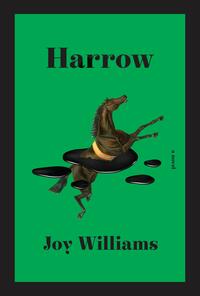Take a photo of a barcode or cover
This is a strange, clever, meandering novel, often quite surreal, with lots of pithy social commentary. It’s set in a future time in which the environment no longer really supports life, and yet people keep on living, finding niches in a largely dysfunctional society. Williams creates a mood of bleakness and confusion, in an unremittingly ugly world.
The novel follows Khristen, a child who has been convinced by her mother that she’s special because she died and then was revived. She sends her to a boarding school, an old sanatorium with cold rooms and strange traditions – for example, yelling quotes from Nietzsche.
This doesn’t last long, as the school abruptly closes, and the students are sent away. Khristen sets out to find her mother, but ends up in a hotel around a big moribund lake, populated by dying old people who have pledged to take out the environmental abusers (whoever they are) as their last acts. One old woman has decided to take out the whole city of Phoenix, which should never have been built in the middle of the desert. The hotel closes, and Khristen wanders vaguely around during the last part of the book, spending time with a boy-judge (a rather clunky metaphor in my opinion).
Here are some quotes:
< She took pride in her specialty and enjoyed explaining her work, which was to spiritualize the wants of consumers. Our spiritual development depended upon transcending nature. It is our moral destiny to technologically dominate the earth. The managed enhanced invented artificial environment would be quite lovely once the messiness was past. >
< She was astonished at how insincere she could be, but her mother was always questioning the authenticity of the authentic and urged her to do so as well.>
< The train wicked something sizeable away from the tracks. An instant before, whatever it was had stood mesmerized by the single white eye of disturbing brightness hastening toward it. >
< Khristen tried to picture the desert fathers. They were toothless and glorious, lunging through black sands, preaching to the dung beetles and confronting the devil whenever feasible. When they died, lions, weeping, dug the graves with their great claws. >
The novel follows Khristen, a child who has been convinced by her mother that she’s special because she died and then was revived. She sends her to a boarding school, an old sanatorium with cold rooms and strange traditions – for example, yelling quotes from Nietzsche.
This doesn’t last long, as the school abruptly closes, and the students are sent away. Khristen sets out to find her mother, but ends up in a hotel around a big moribund lake, populated by dying old people who have pledged to take out the environmental abusers (whoever they are) as their last acts. One old woman has decided to take out the whole city of Phoenix, which should never have been built in the middle of the desert. The hotel closes, and Khristen wanders vaguely around during the last part of the book, spending time with a boy-judge (a rather clunky metaphor in my opinion).
Here are some quotes:
< She took pride in her specialty and enjoyed explaining her work, which was to spiritualize the wants of consumers. Our spiritual development depended upon transcending nature. It is our moral destiny to technologically dominate the earth. The managed enhanced invented artificial environment would be quite lovely once the messiness was past. >
< She was astonished at how insincere she could be, but her mother was always questioning the authenticity of the authentic and urged her to do so as well.>
< The train wicked something sizeable away from the tracks. An instant before, whatever it was had stood mesmerized by the single white eye of disturbing brightness hastening toward it. >
< Khristen tried to picture the desert fathers. They were toothless and glorious, lunging through black sands, preaching to the dung beetles and confronting the devil whenever feasible. When they died, lions, weeping, dug the graves with their great claws. >
The writing is wonderful, the sentences surreal. But, the story just felt out of my grasp too often. This is one I’ll need to revisit.
Biblically grim and powered by soul-deep despair, yes, but also depicts a post-apocalyptic world where they're still showing Heat (1995) on TV, so it's not all bad.
Anger about the destruction of the planet is palpable. But the story itself remains almost impenetrable because of the unreliability of the narrators, every bloody last one of them.
just feel like more should've happened between immense bouts of philosophical circle jerking but hey i'm not a novelist
Started reading after the election, couldn’t hang with it
challenging
dark
tense
medium-paced
Plot or Character Driven:
A mix
Strong character development:
Complicated
Loveable characters:
Complicated
Diverse cast of characters:
No
Flaws of characters a main focus:
Yes
I enjoyed this book, but I'm not sure I understood it. Not one to read just before you go to sleep, as you really need to be awake in order to follow the story - such that it is - and it's quite dreamlike and doesn't necessarily feel narrative at points. Still, it's a fascinating (if pessemistic) telling of a post-apocalyptic America, and I'm glad I read it.
Moderate: Animal cruelty
Esoteric, inaccessible, absurd and nuggets and nuggets and nuggets of wisdoms on every page. Joy Williams is fascinating and maybe this isn't her best book, but for a newcomer like myself it's as good as any.
challenging
reflective
sad
slow-paced
Plot or Character Driven:
Character
Strong character development:
Complicated
Loveable characters:
No
Diverse cast of characters:
Complicated
Flaws of characters a main focus:
Complicated




